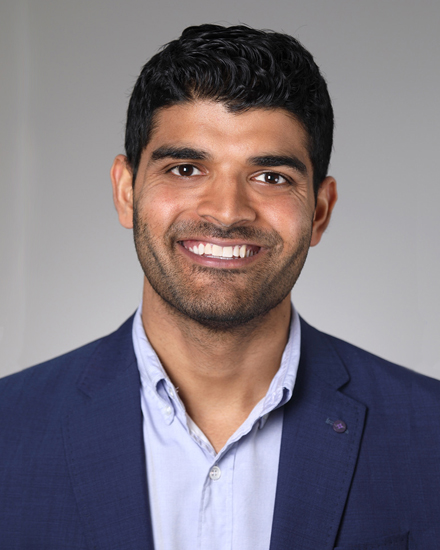Roles
Assistant Professor of Neurological Surgery
-
Biography
Dr. Shah is Assistant Professor of Neurological Surgery at the University of Miami Miller School of Medicine. He was born and raised in Corpus Christi, Texas. He graduated summa cum laude with a B.S. in Biology, Chemistry and Spanish. During his undergraduate studies, Dr. Shah was awarded the prestigious Foote Fellowship and inaugurated in the Phi Beta Kappa honor society. He received his medical degree from the University of Miami Medical School, where he was inducted into the Alpha Omega Alpha Honor Society. He completed his neurosurgical internship and residency at the University of Miami/Jackson Memorial Hospital, followed by a fellowship in Surgical Neuro-Oncology at the University of Miami. Following residency, Dr. Shah completed another fellowship in Translational Neuro-Oncology at the National Institutes of Health within the Surgical Neurology Branch where he specialized in clinical trials for brain tumors.
As Director of Clinical Trials and Translational Research within the University of Miami Brain Tumor Initiative, Dr. Shah’s main clinical interests include surgical and radio surgical treatment of primary and metastatic brain tumors as well as pituitary lesions and meningiomas. Dr. Shah is a specialist in minimally invasive approaches to brain tumors utilizing cutting-edge techniques such as Laser Interstitial Thermal Therapy, Gamma Knife Radiosurgery, Awake Craniotomies, and Robotic Neurosurgery. Dr. Shah is an investigator on several clinical trials aimed at improving outcomes for our brain tumor patients.
Dr. Shah is currently serving as principal investigator for the Section of Virology and Immunotherapy and Director of clinical trials and translational research in the UMBTI. The laboratory goal is to develop novel treatment options for brain tumors including virotherapies, immunotherapies, and targeted molecular therapeutics. Dr. Shah has authored over 200 peer-reviewed scientific articles, book chapters and invited editorials, and has received funding from the National Institutes of Health as well as other national and regional grants for his research. He is a member of the Society of Neuro-oncology, American Association of Neurological Surgery and the Congress of Neurological Surgery. He is a reviewer for several neurosurgical and virology journals.
Aside from his clinical work, Dr. Shah is deeply invested in mitigating global health disparities. Since 2008, Dr. Shah has actively involved with Project Medishare to create a sustainable neurosurgery residency program in Haiti in collaboration with the Haitian Minister of Health and the Dean of the National School of Medicine in Port-Au-Prince. The work in Haiti has been internationally recognized by the World Federation of Neurological Surgery and has been funded by national and regional organizations. -
Education & Training
Education
-
Honors & Awards
No result found
-
Teaching Interests
Diagnosis and Treatment of Brain Tumors
Glioblastoma/Glioma
Metastatic Tumors
Pituitary Tumors
Meningioma
Hydrocephalus
Meningitis
Virotherapies
Chiari Malformation and Syringomyelia
Immunotherapies -
Research Interests
My lab (The Section of Virology and Immunotherapy) within the UMBTI focuses on studying the interplay between viruses and cancer. The laboratory investigates mechanisms of viral oncogenesis and novel viral-based therapeutics for cancer. A key component of our research is to advance our understanding of the cancer vir-ome, glioma immunology, and novel drug targets. Housed within the University of Miami Brain Tumor Institute, the SVI is primarily focused on rapidly translating these discoveries to advance the treatment of malignant brain tumors. We have several main projects including the following:
The role of endogenous retroviruses in Gliomas: Human endogenous retroviruses (HERVs) account for approximately 8% of the human genome, but are inactive in normal tissues. In several cancers and neurodegenerative conditions, HERV expression may be pathologically activated. We have demonstrated pathological expression of one of these viruses, HERV-K, in gliomas. As a result, we are now employing several techniques to understand the function of HERV-K in gliomas, and develop novel treatments to target aberrant HERV-K expression.
Glioma Virotherapy: The SVI also focuses on the development of novel viral-based therapeutics that have marked anti-cancer activity. Given the protected environment of the brain, the laboratory is focused on investigating how novel neurotropic viruses can specifically target glioblastoma and mediate anti-tumor immunity. Our lab hopes to continue development of novel viral vectors that are capable of selectively targeting and killing brain tumors.
Potentiation of Immunotherapy:
The laboratory focuses on studying the cancer immune microenvironment to understand mechanisms of immunosuppression. The laboratory utilizes a multi-omic approach to assess immune responses before and after brain tumor surgery. The section is interested in developing:
1. Novel biomarkers that predict response to immunotherapy
2. Imaging Modalities to visualize the immune response in brain tumors
3. Therapeutics that may synergistically activate immunotherapy: Viral Mimicry in gliomas -
Publications
Disclaimer: The information presented in this section has been consolidated using AI and machine learning technologies. While every effort has been made to ensure accuracy, errors may occur. If you identify any inaccuracies, please use this link to inform our data team. Your feedback is greatly appreciated and helps us improve the quality of our content.
-
Professional Activities
No result found


